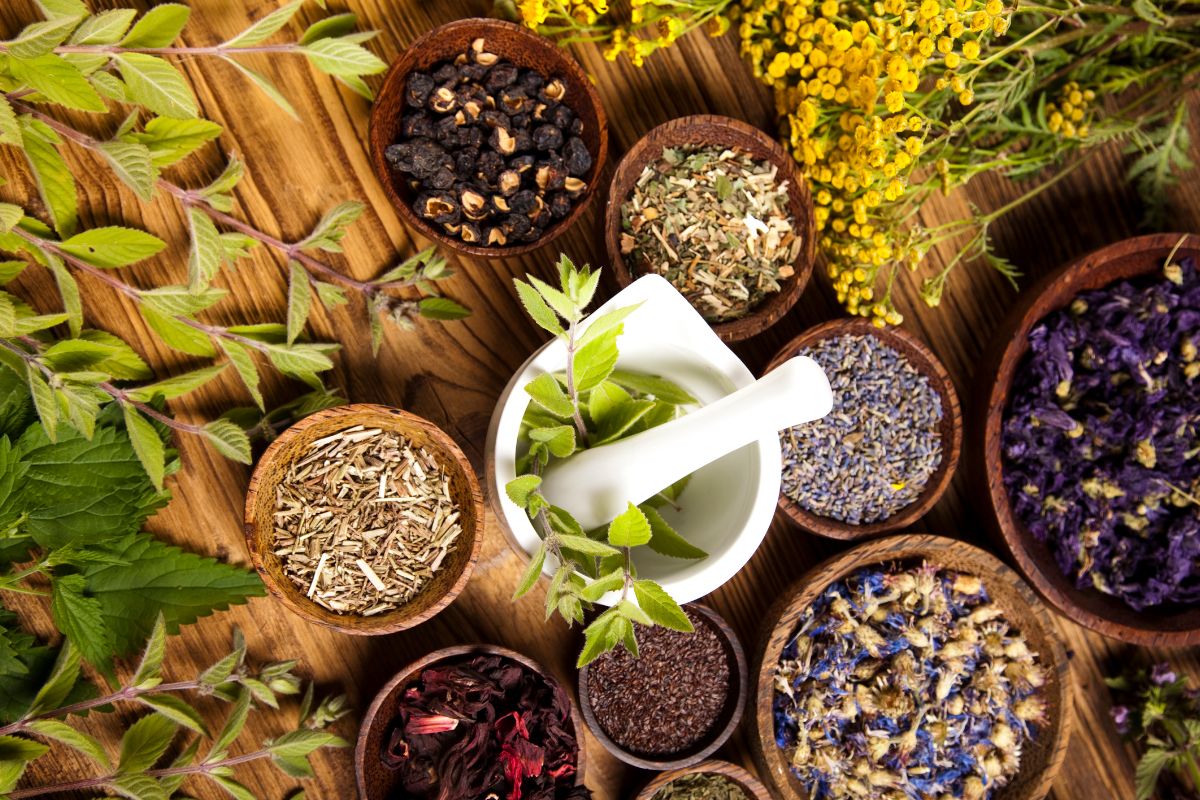Have you ever finished a meal feeling bloated, heavy, like the food is just sitting there in your stomach? Yeah… we’ve all been there at least once. Whether it’s after a big Sunday lunch, a party with too much food, or even during a stressful day, our digestive system takes the hit. And when it’s not working properly, your whole body feels it: fatigue, irritability, heartburn, gas, and other discomforts that can seriously mess with your mood.
The good news is that nature has your back — simple, accessible, and powerful remedies that really work. Some plants, which you probably already have at home or can easily find at the local market, have amazing properties that relieve digestive symptoms, help the intestines function better, and balance gastric juices. Best of all? They’re natural, safe (when used with care), and backed by generations of wisdom passed down through time.
In this article, I’ll share the top 5 medicinal plants that help with digestion — ones I’ve personally used, ones my grandma swore by, and ones science now supports too. I’ll explain how each one works, how to use them in daily life, and how they can help you say goodbye to that uncomfortable post-meal feeling. Let’s dive in? Your stomach will thank you later!
🌿 Why Taking Care of Your Digestion Matters (More Than You Think)
It might sound like a stretch, but digestion is kind of the secret core of our well-being. When it’s working well, everything flows: you feel more energetic, less bloated, your mind functions better, and yes, even your mood improves. On the flip side, when your digestion is off… things go downhill fast. You might feel tired even after a full night’s sleep, start getting unexplained headaches, notice changes in your skin — and of course, deal with annoying issues like gas, heartburn, constipation, or diarrhea. And often, we don’t even realize these things are connected to poor digestion — but they absolutely are.
Digestion is the process that turns the food we eat into nutrients our bodies can absorb and use. It sounds simple, but it’s actually a delicate system that can get thrown off pretty easily. Eating too fast, relying on processed foods, overloading on fried stuff, or living under constant stress — all of these put serious strain on your gut. And it’s not just your body that reacts. There’s a direct connection between your gut and your brain — so much so that the gut is often called our “second brain.”
Poor digestion doesn’t just affect your stomach; it impacts your liver, kidneys, and overall balance. A sluggish gut, for instance, can lead to toxin buildup and weaken your immune system, trigger inflammation, and even increase anxiety or irritability. It’s a sneaky domino effect, but very real. That’s why keeping your digestion in check isn’t just about comfort — it’s about whole-body health.
And this is where medicinal plants that help with digestion come in. They act as gentle, natural allies that help your body do what it already knows how to do — just more efficiently. Instead of relying solely on medication that might only mask the symptoms, these herbs support and balance your system in a more sustainable way. It’s like giving your digestion a little nudge in the right direction — and your body will love you for it.
🍃 1. Peppermint – Refreshing and Powerful
Peppermint is one of those plants you can recognize from across the room by its smell. Refreshing, flavorful, and super versatile, it’s way more than a tasty addition to drinks or desserts. In the world of medicinal plants that help with digestion, peppermint is a total rockstar. It works by relaxing the muscles in your digestive tract, which helps ease cramps, gas, and that bloated, stuffed feeling. Its main compound, menthol, has antispasmodic properties, meaning it can calm down those annoying stomach spasms.
What’s really cool about peppermint is that it also soothes the nervous system. So if your digestive issues are tied to stress or anxiety — which is super common — peppermint works on both fronts. A cup of peppermint tea is like a mini reset button after a heavy meal or a stressful day. Personally, I’ve had it after many food comas (hello, barbecue nights!) and it always does the trick. For an extra kick, try mixing it with chamomile or fennel in your tea — it’s a relaxing, digestion-loving combo that’s hard to beat.
🌼 2. Chamomile – Soothes the Stomach and the Soul
Chamomile is basically a warm hug in a cup. Most of us grew up hearing that it helps calm us down — and it absolutely does — but its benefits go way beyond relaxation. Chamomile is a true ally for digestion thanks to its anti-inflammatory, antispasmodic, and carminative properties. In simpler terms, it helps reduce inflammation in your gut, relaxes digestive muscles, and eases bloating and gas. If your stomach tends to get upset during stressful times, chamomile is a gentle, natural way to settle things down.
Another amazing thing about chamomile is how it supports both your gut and your mind. That gut-brain connection we talked about earlier? Chamomile taps into that beautifully. It calms your nervous system while also improving gut function. I’ve had countless nights where my stomach was tense and turning — and a cup of chamomile tea with a little honey helped me relax and sleep better. It’s simple, soothing, and totally underrated.
🧄 3. Ginger – The Root That Gets Things Moving
When it comes to digestion, ginger never lets you down. This fiery root is loaded with anti-inflammatory and antioxidant properties, and it’s especially good at stimulating digestive enzymes and speeding up gastric emptying. That means food won’t sit in your stomach too long, reducing that heavy, sluggish feeling. Plus, ginger is excellent for fighting nausea — whether it’s from motion sickness, poor digestion, or anxiety.
What I love most about ginger is how easy it is to use. You can toss it into teas, soups, juices, or even chew on a small piece (yes, it’s spicy, but it works!). One of my go-to remedies after a greasy meal is hot water with ginger and lemon — it’s a lifesaver. Just keep in mind: ginger is quite stimulating, so if you have high blood pressure or sensitive stomach issues like ulcers, it’s good to check in with a healthcare professional first. But overall, it’s a powerful, natural digestive booster that’s always worth having around.
🌱 4. Fennel – Bye-Bye, Bloating!
Fennel, also known as sweet anise, is that gentle yet effective herb with a naturally sweet flavor. Its seeds are rich in a compound called anethole, which gives fennel its carminative powers — in other words, it helps release trapped gas and eases bloating. It’s also antispasmodic, so it can relax digestive muscles and reduce cramping. If you often feel bloated or sluggish after eating, fennel tea might become your new best friend.
What I really love about fennel is how mild it is — even babies can benefit from it (with proper guidance, of course). It’s gentle on the stomach, easy to prepare, and the flavor is naturally pleasant. A warm fennel tea after meals is soothing and effective, and if you mix it with peppermint? Game over — it’s delicious and seriously calming. Bonus: fennel also has mild calming effects on the nervous system, so it can help reduce stress-related digestive issues too. It’s that little seed with big power.
🍃 5. Boldo – The Bitter Classic That Works
Boldo is a bit of a love-it-or-hate-it herb — the smell and taste are strong, no denying that. But when it comes to stubborn digestion issues, boldo works like magic. Its bitterness stimulates the liver to produce bile, which helps break down fats more efficiently. After a heavy or greasy meal, boldo tea can ease that stuck, bloated feeling and help you digest faster. It also has mild anti-inflammatory and laxative effects, which support overall gut health.
That said, boldo is a powerful plant and should be used in moderation. Because of its potency, it’s not recommended for long-term use or for people with liver issues, gallstones, or during pregnancy. Personally, I only reach for boldo when I really need it — and even then, just a couple of leaves in hot water is enough. Sure, the taste takes getting used to, but the relief comes fast. Sometimes, the old-school remedies are the ones that truly work.
☕ How to Add These Plants to Your Daily Life
The great news is that adding these medicinal plants that help with digestion to your routine doesn’t have to be complicated. One of the easiest and most effective ways is to prepare teas or infusions, especially after meals. Whether you use fresh or dried herbs, it’s all about building a little habit. A cup of peppermint or chamomile tea after lunch can make a huge difference in how you feel — and it becomes a moment of calm in your busy day.
You can also get creative and mix them into juices, smoothies, or even meals. Fresh ginger in your stir-fry, fennel seeds in homemade bread, or mint leaves in your salad — there are plenty of ways to get the benefits without relying only on teas. Another tip is to prep your own herbal blends and keep them in jars, ready to go. That way, even on your busiest days, relief is just a steep away. Try it out and see what works for your body — it’s all about finding your own rhythm.
💬 Final Thoughts: Nature’s Got Your Back
At the end of the day, knowing that relief can come from your kitchen cabinet is empowering. Instead of reaching for meds every time your stomach acts up, you can turn to these medicinal plants that help with digestion for gentle, natural support. They not only ease symptoms like bloating and gas but also work long-term to improve your gut health — and by extension, your overall wellness.
What’s even more beautiful is how this brings us back to ancestral knowledge — remedies passed down by grandmothers, healers, and ancient traditions. These plants aren’t a fad or a trend; they’ve stood the test of time and are now backed by science too. And the best part? You don’t need to overhaul your life. A simple cup of tea here and there can make all the difference.
So, how about starting today? Pick the herb that speaks to you and make your first post-meal tea. Notice how your body responds. Create your routine, experiment with combinations, and most importantly, listen to your gut — literally. And hey, if you already use some of these plants, drop your favorite tip or blend in the comments. Let’s share what we know and keep this circle of natural care growing. 🌿✨
If you want to dive deeper into the topic, I highly recommend checking out this super informative video from the channel Saúde na Rotina: 5 Plants That Improve Digestion. It offers clear, practical explanations — perfect for anyone looking to understand how these herbs work in the body and how to use them in daily life. Totally worth a watch! 🌿💡

Sam Bright is a passionate researcher of the power of medicinal plants and their benefits for health and well-being. With years of study and practice in the use of therapeutic herbs, he is dedicated to sharing accessible, evidence-based knowledge on how nature can support health holistically.
Through his blog, Sam explores everything from the traditional uses of plants to modern scientific discoveries, always with a practical and informative approach. His goal is to help people integrate herbal medicine into their daily lives in a safe and effective way.

